- Home
- Peter Swanson
Her Every Fear
Her Every Fear Read online
Dedication
For Susan, Jim, David, and Jeremy
Epigraph
Every fear is a desire. Every desire is fear.
The cigarettes are burning under the trees
Where the Staffordshire murderers wait for their accomplices
And victims. Every victim is an accomplice.
—James Fenton, “A Staffordshire Murderer”
Contents
Cover
Title Page
Dedication
Epigraph
Part I: Long-Leggedy Beasties Chapter 1
Chapter 2
Chapter 3
Chapter 4
Chapter 5
Chapter 6
Chapter 7
Chapter 8
Chapter 9
Chapter 10
Chapter 11
Chapter 12
Chapter 13
Chapter 14
Chapter 15
Chapter 16
Chapter 17
Chapter 18
Chapter 19
Chapter 20
Chapter 21
Chapter 22
Chapter 23
Chapter 24
Chapter 25
Chapter 26
Chapter 27
Chapter 28
Chapter 29
Part II: An Even Split Chapter 30
Chapter 31
Chapter 32
Chapter 33
Chapter 34
Chapter 35
Chapter 36
Chapter 37
Chapter 38
About the Author
Also by Peter Swanson
Credits
Copyright
About the Publisher
Part I
Long-Leggedy Beasties
Chapter 1
The fastest route from Logan Airport to downtown Boston is a mile-long tunnel called the Sumner. Dark, damp, and low ceilinged, the Sumner feels as though it were built a hundred years ago, which it very nearly was. And on Friday, April 24, a warm spring evening, a Boston University freshman ran out of gas halfway through the tunnel, reducing rush-hour traffic to just one slow-moving lane, instead of the usual two. Kate Priddy, who had never been to Boston and had no idea she would wind up in a tunnel under Boston Harbor, sat in the back of a stopped taxicab and began to panic.
It was not her first panic attack, not even of that particular day. She’d had one earlier that morning when she’d stepped outside of her flat in Belsize Park in London into a cold, gray dawn and suddenly felt like the whole idea of the apartment swap had been the worst idea she’d ever agreed to. But she’d done her breathing exercises, and repeated her mantra, and told herself that it was too late to back out now. Her second cousin, whom she’d never met, was on an overnight flight from Boston to London at this very instant. He was taking her flat for six months while she was going to live in his apartment in Beacon Hill.
But this attack, with the taxicab stalled in the dark tunnel, was far worse than anything she’d had for a long while. The glistening walls of the endless tunnel curved at the top. It was like being inside a massive constricting snake, and Kate felt her stomach fold within her, her mouth turn dry.
The taxicab crept forward. The backseat smelled of body odor and the flowery perfume of some car deodorant. Kate wanted to roll down the window, but didn’t know what taxicab customs were like in the United States. Her stomach folded again, starting to cramp. When did I last go to the toilet, she thought, and her panic ratcheted up a notch. It was such a familiar feeling: heart speeding up, limbs turning cold, the world sharpening before her eyes. But she knew what to do. Her therapist’s voice was in her head. It’s just a panic attack, an accidental surge of adrenaline. It can’t hurt you, or kill you, and no one will notice it. Just let it happen. Float with it. Ride it out.
But this one’s different, Kate told herself. The danger felt real. And suddenly she was back at the cottage in Windermere, crouched and cowering in the locked closet, her nightgown wet with urine, George Daniels on the other side of the door. She felt almost like she’d felt then, cold hands inside of her, twisting her stomach like it was a damp dish towel. There’d been the shotgun blast, then the terrible silence that lasted for hours and hours. When she’d finally been pulled from the closet, her joints stiff and her vocal cords raw from screaming, she didn’t know how she was still alive, how the fear hadn’t killed her.
The sound of an echoing horn brought her back inside the cab. She pushed the thoughts of Windermere, of George, away, and breathed in as deeply as she could, even though it felt like something heavy was sitting on her chest.
Face it. Accept it. Float with it. Let time pass.
The words weren’t working, and Kate could feel her throat closing, becoming a pinhole, her lungs frantically trying to pull in oxygen. The back of the cab now smelled like that closet had, mustiness and rot, as though something had died many summers ago in the walls. She thought of running, and that thought filled her with even more panic. She thought of her pills, her prescription benzodiazepines, that she rarely took anymore but that she’d brought anyway, the way a child who doesn’t need his blankie anymore still keeps it close at hand. But the pills were in her suitcase, which was in the bloody boot of the cab. She opened her dry mouth to say something to the cabdriver, to ask him to pop the boot, but the words didn’t come out. And that was the moment—one she’d had many times—when she became convinced that she really was dying. Panic attacks can’t kill you. Of course they can’t, she thought, and squeezed her eyes shut anyway, as though a train were barreling down on her. It was the worst thing to do. The world dissolved into a closet full of blackness, death choking her. Her insides began to liquefy.
Face it. Accept it. Float with it. Let time pass.
The cab jolted forward a whole car length, then stopped again, and that small movement made her feel slightly better, as though saying the mantra had caused the car to move in the first place. She repeated it again, while doing her breathing exercises.
The driver shook a hand, his fingers spread, and muttered something at the dirty windshield in a language Kate didn’t understand. For some reason, she’d thought that cabdrivers in America would be stereotypically American—short men with caps and cigar stubs and loud American voices. But this cabdriver was turbaned and heavily bearded; except for the fact that he was sitting on the left side of the car, she might as well have been in London.
“How long is this tunnel?” Kate managed to ask through the partition. Her voice sounded cracked and timid in her own ears.
“There’s something up ahead.”
“Is it always like this?”
“Sometimes,” the driver said, then shrugged.
Kate gave up and moved back from the partition. She rubbed her hands along her thighs. The cab kept jerking forward, a few feet at a time, but after it passed the stalled Chevy, two lanes opened up and the cab was moving again. Kate breathed in through her nose and out through her mouth. She unclenched a hand and one of her knuckles cracked. She began to tap her thumb against her fingertips in ordered succession. The pinhole that was her throat opened up a little.
They cleared the tunnel, and Kate caught a glimpse of swollen clouds dominating the sky just before the cab dipped and swayed into another tunnel, but one in which the traffic was barreling along. The cabdriver made up for lost time before emerging onto another fast-moving road that wound along the Charles River. There was enough light left in the sky for Kate to make out the backsides of brick houses whipping past on her left. On the river, a rower on a scull skimmed along its placid surface.
The driver took a sudden, lurching left, doubling back to get onto a narrow road, square, brick houses on either side, bloss
oming trees along the sidewalk.
“Bury Street,” announced the driver.
“It’s 101.”
“Got it.” The driver sped up, then slowed down and halted suddenly, one wheel riding up onto the sidewalk, in front of a brick archway surmounted by a small stone on which the number 101 was carved. Kate could see into a courtyard with a low fountain. The apartment building, three stories high, ran along three sides of the courtyard. Kate’s stomach ached a little, a leftover from her earlier panic attack, and she thought guiltily of her second cousin, Corbin Dell, arriving at her unexceptional flat in North London earlier in the day. But he’d known what he was getting. They’d sent several e-mails back and forth. Her one-bedroom was cozy and conveniently located near a tube station, but Corbin’s place—she’d seen the pictures—was like something out of a Henry James novel. Still, she hadn’t been prepared for the courtyard entrance, very Italian, that seemed out of place with the small amount of Boston she’d already seen.
She waited on the curb while the driver removed her two bags—a large rollie and an even larger duffel bag. She’d gotten dollars at her bank in London the previous week and she paid the driver with the thin, papery notes, not quite knowing what to tip, so probably giving him too much. After he drove off, she balanced the duffel bag onto the rollie and made her way through the archway.
She was midway across the courtyard, paved half in flagstone and half in brick, when the central door swung open and a doorman shaped like a pear darted out waving his hand.
“Hello, hello,” he said. He wore a long brown raincoat over a suit, and a peaked cap. Under the cap he wore dark-framed glasses with thick lenses. He had dark black skin and a very white mustache, one side slightly thicker than the other.
“Hi,” Kate said. “I’m Katherine Priddy. I’m here to stay in Corbin Dell’s apartment.”
“Right. I know all about it. Mr. Dell’s moving to London for half a year and you’re moving here. London’s loss and Boston’s gain, I suspect.” He winked at her, and some of the tension that was still gripping her chest dissipated.
“I don’t know about that,” Kate said.
“I’m rarely wrong,” he said. Kate had read somewhere that Bostonians were notorious for their lack of warmth, but the doorman was proving otherwise.
“I see you brought everything you own,” he said, surveying the two bags. Kate sensed, more than saw, a woman pass by her and into the building. The doorman didn’t seem to notice.
“If you can get the suitcase, I can get the duffel,” Kate said, and the two of them managed to navigate the three worn marble steps that led to the building’s lobby. He left the suitcase on the tiled floor and moved swiftly to the other side of the front desk. He was light on his feet for a heavy man.
“I promised Mrs. Valentine I’d call when you got here. She’s the president of the building association, and wanted to give you the tour of your new apartment.”
“Oh okay,” Kate said, looking around. The lobby was narrow but beautiful. A glass-encased four-lamp chandelier hung from the high ceiling. The walls were painted in a lustrous shade of cream.
“Miss Priddy is down here in the lobby,” he said into the telephone, then replaced the receiver. “She’ll be right down. Let’s get your luggage onto the elevator. You’re on the third floor of the north wing. You have a nice view of the Charles. Have you been to Boston before?”
While Kate told him that she had actually never been to the States before, a tall, painfully thin woman somewhere in her seventies came down one of the side stairs, her shoes clacking percussively on the tiled steps. She wore a long black dress and a floral scarf around her neck. Her hair was silver and pinned up into an elaborate bun. Kate wondered if she always dressed like this or if she was going out later. The woman introduced herself as Carol and shook Kate’s hand. Her hand was like a bundle of chopsticks covered in a layer of tissue paper.
“I’m sure you could have figured out Corbin’s apartment all by yourself, Kate, but I thought it wouldn’t hurt to have a welcoming committee.” After the doorman had loaded Kate’s luggage into the elevator, Carol got the key from him, then took Kate up the winding stairway. “Do you mind walking? It’s my daily exercise.”
Kate told her she was happy to walk, relieved that she didn’t have to ride the elevator.
At the third floor, Carol turned left and Kate followed her down a dark, carpeted hall, with a doorway on the left, one on the right, and one at the end. A woman about Kate’s age was rapping on the door on the left. Kate thought she was the woman who had flitted by earlier in the courtyard.
“Can I help you?” Carol asked loudly.
The woman turned. She wore jeans and a scoop-neck sweater. Her dark hair was cut in a bob, and she was almost pretty, except for the lack of a chin. It was so noticeable that Kate wondered, for a moment, if she’d been in some kind of terrible chin-obliterating accident.
“Do you work here? Could I get a key for this door? I’m worried about my friend.” Her voice was nasal, pitched high with anxiety.
“Why are you worried?” Carol asked. “Is everything okay?”
“I can’t get in touch with her. We were supposed to have lunch, and I called her work and she didn’t show up there, either. And now I’m worried.”
“Did you talk with our doorman?”
“No, I just came straight up here. It’s not like her, you know. I’ve texted her, like, a thousand times.”
“I’m sorry,” Carol said. “I don’t have a key, myself, but maybe you should speak with our doorman Bob. He’ll know something. What’s the name of your friend?” Carol had started to walk again, and so did Kate.
“Audrey Marshall. Do you know her?”
“I’ve met her, dear, but don’t know much about her. Go talk with Bob. He’ll help you. He should have helped you when you first arrived.”
Kate found herself walking along the edge of the hall, her shoulder almost rubbing against the paneled wall. The upset friend, with her shrill, panicked voice, had caused Kate’s chest to seize up again, the panic inside of her like an expanding balloon. She thought of her pills, in the toiletry bag in the rollie, unreachable for now.
“It’s so unusual,” Carol was saying, as she slid a key into the lock of the door at the end, “for someone to be in here without having gone through the doorman first. I’m sure there’s actually nothing wrong with anybody.” She said this as though nothing bad had ever happened to anyone anywhere. It was the type of ridiculous but well-meaning proclamation that Kate’s father might make. Kate, herself, from the moment she saw the worried woman knocking frantically on her new neighbor’s door, knew that someone was dead. It was how her mind worked. And knowing that her mind worked that way—constantly stretching logic all the way to its worst possible conclusion—did not lessen her certainty. Already that day, Kate had known that the youth with the sweaty forehead and the fuzzy mustache in the departures lounge was carrying a homemade explosive device in his backpack. And she had known that the stretch of turbulence over the Atlantic Ocean would grow in ferocity until it ripped one of the jet’s wings off as easily as a sadistic child shredding a butterfly. These hadn’t happened, but that didn’t mean that behind the door down the hall, there wasn’t a dead or dying girl. Of course there was.
Kate turned her attention to Carol, who was still fiddling with the key. She wondered if the tumblers of the lock were too much for Carol’s birdlike bones to handle, then heard, with immense relief, the oily snap of the door unlocking. Even though she’d never been in Corbin’s apartment, she’d already taken possession of it in her mind. She badly wanted to get inside and feel the safety of a home. It felt like years since she’d stepped out of the comfort of her London flat, double-checking the lock of the outside door, a minicab idling at the curb. Carol swung the door inward just as Kate heard voices again in the hall. She turned to see the doorman, Bob, lugging the duffel bag, the chinless woman at his side protesting her case. “Let me take car
e of this young lady first, then we’ll see to your friend,” he was saying.
Carol ushered Kate into her new home, and Kate immediately asked for the toilet. “Of course, dear, there’s one attached to the bedroom,” Carol said, pointing, and Kate walked rapidly, barely taking in the extravagance of her surroundings before shutting herself into an enormous bathroom, tiled in black and white. She sat on the toilet lid, and even though she knew the pills weren’t there, she opened her purse anyway. Inside, tucked into the side pocket, was her plastic bottle of benzodiazepines. As soon as she saw them, she remembered moving the bottle from her suitcase to her bag early that morning. How had she forgotten that so soon? With trembling hands she unscrewed the lid and dry-swallowed a pill. A feeling of dread—almost worse than the panic—spread over her.
She should never have come to America.
Chapter 2
Even though the apartment was enormous, it shouldn’t have taken Carol Valentine thirty minutes to deliver the tour, but she clearly relished the role. She pointed out the walnut-stained oak floors, the coffered ceilings, the working fireplace, and what she called the Juliet balcony, which was really just a hip-high railing one foot out from the floor-to-ceiling French doors that Kate knew she would never open. The apartment wasn’t particularly high up, but it was high enough.
“You like it?” Carol asked, after the tour was complete, even though Kate had expressed her admiration about thirty times already.
“I do. I love it. Cozy.”
“It’s beautifully furnished, don’t you think? You’d think a young man like Corbin . . .” Carol left the thought unfinished and smiled with just her mouth, the papery skin that covered her face shifting in such a way that Kate felt like she could see the exact contours of the woman’s skull. “What’s your apartment—your flat—like in London?”
“All of it would fit in this living room,” Kate said. “I’m feeling a little guilty. I got the better bargain.”

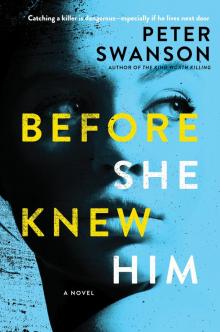 Before She Knew Him
Before She Knew Him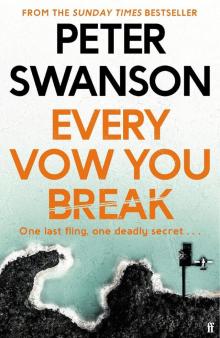 Every Vow You Break
Every Vow You Break Eight Perfect Murders
Eight Perfect Murders Rules for Perfect Murders
Rules for Perfect Murders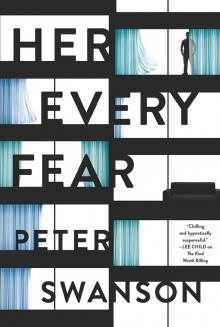 Her Every Fear
Her Every Fear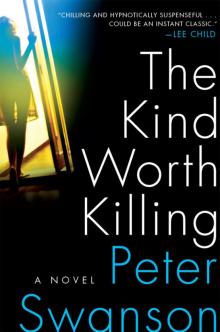 The Kind Worth Killing
The Kind Worth Killing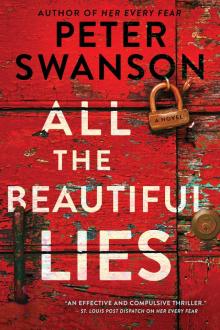 All the Beautiful Lies
All the Beautiful Lies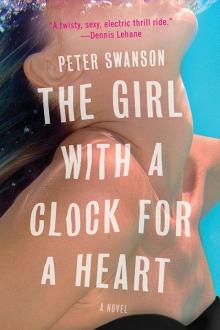 The Girl with a Clock for a Heart: A Novel
The Girl with a Clock for a Heart: A Novel